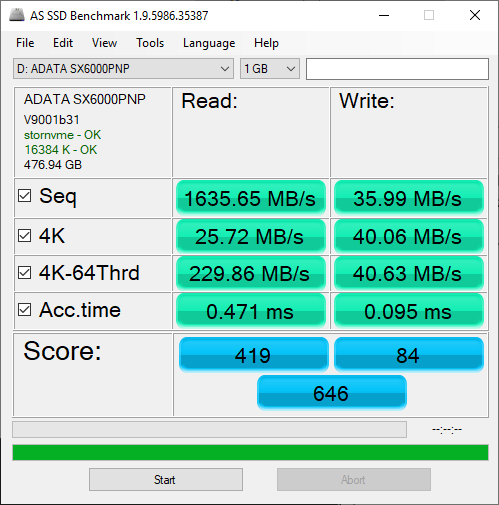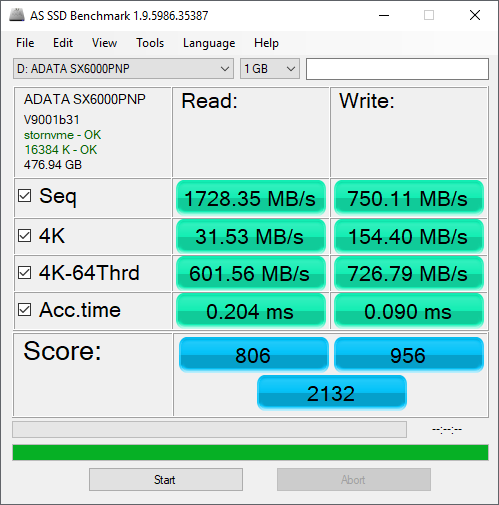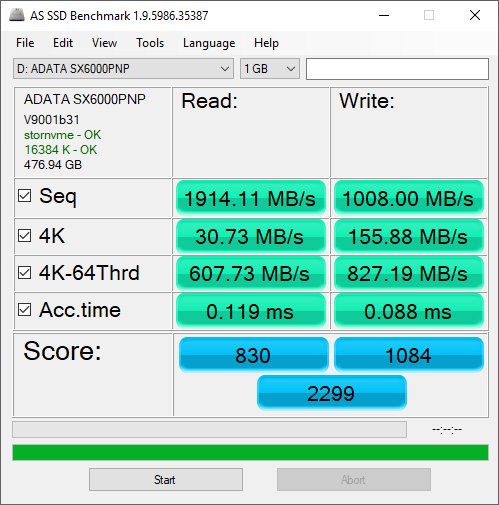TRIM Performance:
While SSD's offer many benefits, there are some downsides to using flash memory. One of the biggest issues people run into is performance degradation. Over time, an SSD will run out of fresh blocks and will have to write over data the file system has marked as deleted. This procedure is very complicated and can slow an SSD's write speeds considerably.
To fix this problem, most manufacturers have added TRIM support to their SSDs. The TRIM command allows an operating system, such as Windows 10, to tell an SSD which data blocks are no longer in use. Using this information, the drive pro-actively erases these blocks and adds them to the free block pool.

To test the SX6000 Pro's TRIM and garbage collection functions, I first put the drive in a "dirty" state. I used Iometer to fill 80% of the drive and then ran a random write test for 30 minutes. Looking at the screenshot below, you can see that the SX6000 Pro's average read and write speeds dropped to 1635.65 MB/s and 35.99 MB/s, respectively.

ADATA SX6000 Pro - Dirty
To see how well the SX6000 Pro could recover, I let the computer sit for about 30 minutes and then reran the test. The drive wasn't able to reach the factory fresh performance shown in our earlier tests. However, its sequential write speed jumped up to 750.11 MB/s.

ADATA SX6000 Pro - After TRIM
Lastly, I used Parted Magic to perform a secure erase on the SX6000 Pro. With the drive wiped clean, it had average read and write speeds of 1914.11 MB/s and 1008.00 MB/s, respectively.

ADATA SX6000 Pro - Secure Erased
Final Thoughts:
While not the fastest or most feature packed PCIe SSD to come through the 'Labs, the ADATA XPG SX6000 Pro delivers a lot of bang for your buck. This single-sided, M.2 form factor SSD is powered by Realtek's RTS5763DL controller and is available with up to 1TB of 3D TLC NAND flash. Combine this with a PCIe Gen3 x4 NVMe 1.3 interface and you have an affordable drive capable of delivering up to four times the performance of your average SATA 6Gb/s SSD. In our sequential read and write tests, the 512GB version of the SX6000 Pro was able to read at speeds as high as 2,126 MB/s and write at speeds in excess of 1,547 MB/s. It also did reasonably well in our random write tests, but, for whatever reason, lagged behind many of the other PCIe SSDs when doing random reads at low queue depths.
Of course, fast read and write speeds aren't the only things the XPG SX6000 Pro has to offer. Like most TLC-based SSDs, the drive uses an SLC caching algorithm to optimize performance during sustained writes. The SX6000 Pro also employs LDPC error correcting code technology to detect and fix a wider range of data errors for more reliable data transfers and a longer product lifespan. To top it all off, the drive comes with a sleek black XPG heatsink and is backed by a 5 year warranty.
The XPG SX6000 Pro is available now in 256GB, 512GB and 1TB capacities. Prices on Amazon.com currently range from $40 up to $108, with the 512GB version reviewed here retailing for about $59.

Highs:
- Available in 256GB, 512GB and 1TB capacities
- PCIe 3.0 x4 interface with NVMe protocol
- Realtek RTS5763DL controller
- Equipped with 3D TLC NAND
- Good sequential read and write speeds under most conditions
- Good random write performance
- Small M.2 2280 form factor
- Intelligent SLC caching
- Advanced hardware LDPC ECC technology
- Includes heatsink
- Works with ADATA's SSD Toolbox software
- Reasonably priced
- 5 year warranty
Lows:
- Mediocre random read performance
- Write speed drops considerably when SLC cache is full
- Does not support hardware based encryption

